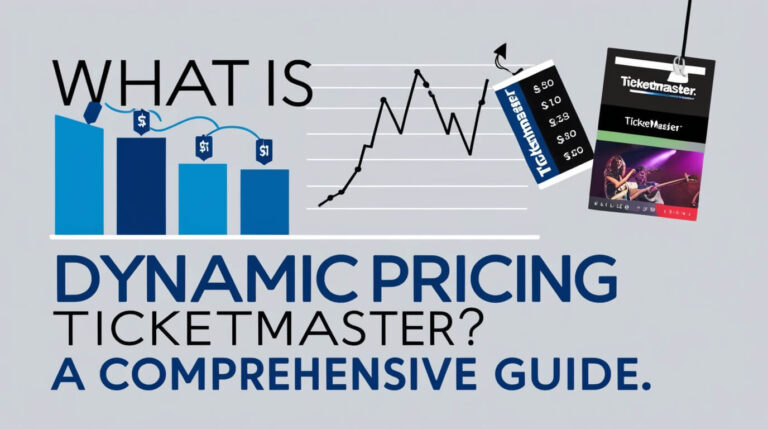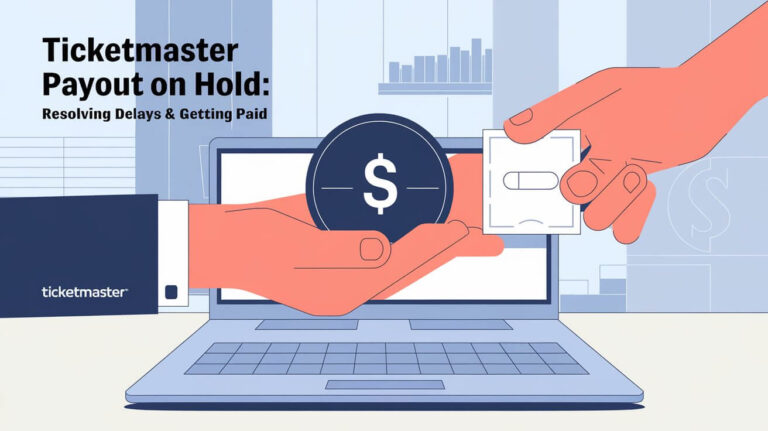The ticket resale world has changed a lot over the years. Ticketmaster and StubHub are at the forefront. They are key players in the ticket market, which is getting more complex.
Ticketmaster is owned by Live Nation, a big name in entertainment. It handles about two-thirds of ticket sales in the U.S. StubHub, though privately owned, is worth $16.5 billion. This shows its big role in the secondary ticket market.
If you sell tickets or are new to the business, this guide is for you. It will help you understand the differences between Stubhub and Ticketmaster. This way, you can choose the best platform for your needs.
Market Dominance and Platform Evolution
The live event ticketing industry is led by big names. Ticketmaster is the top choice for primary tickets, covering about 60% of sales in the U.S. It’s where fans go for tickets to concerts, sports, and more.
Ticketmaster’s Market Share Statistics
Ticketmaster’s success comes from its long history and innovation. It started in 1976 and introduced computerized ticketing in 1982. Its global presence and strong ties with venues make it a favorite for both buyers and sellers.
StubHub’s Position in Secondary Markets
StubHub shines in the secondary ticket market, while Ticketmaster leads in primary sales. Sellers find more visibility on StubHub, thanks to its large audience. This makes it a top pick for reselling tickets.
Digital Transformation Impact
The ticketing world has changed a lot since the 1990s. In 1993, Microsoft co-founder Paul Allen bought 80% of Ticketmaster for $300 million. This move helped Ticketmaster grow and improve its tech. StubHub started in 2000 and joined eBay in 2007, pushing the industry online.
This digital shift has made the market more competitive. New players like SeatGeek, Vivid Seats, and TickPick have entered the scene. The Department of Justice has also stepped in, suing Live Nation for alleged monopoly practices in concerts.
Primary vs Secondary Ticket Markets Explained
There are two main markets for buying event tickets: the primary and secondary markets. The primary market sells tickets directly from teams, venues, or their partners like Ticketmaster. The secondary market resells tickets by brokers or individuals.
The primary market has more rules and oversight. Venues and teams control ticket prices and how they’re sold. The secondary market is more open, with prices set by demand and supply.
| Primary Ticket Market | Secondary Ticket Market |
|---|---|
| Direct ticket sales from teams, venues, or authorized platforms | Resale of tickets by brokers or individual sellers |
| More oversight and control over pricing and distribution | Less regulation, with ticket prices set by resellers |
| Tickets often sold through platforms like Ticketmaster | Platforms like StubHub, Vivid Seats, and Ticketmaster’s secondary sites |
| Fees can range from 13% to 58% of the ticket price | Fees can further increase the overall cost for consumers |
The secondary ticket market has grown a lot, reaching $8 billion in value. This growth is due to more people wanting to see live events and better technology for resellers. But, there are issues like ticket scalping, fake tickets, and unfair prices.
Knowing the difference between primary and secondary markets helps fans. It helps them find good deals and avoid scams when buying tickets.
Selling On Stubhub Vs Ticketmaster
Platform Interface Comparison
Stubhub and Ticketmaster have different ways for sellers to list tickets. Ticketmaster focuses more on the buyer’s side, making it harder for sellers to list their tickets. Stubhub, on the other hand, is easier for sellers to use, offering better ticket listing visibility.
Listing Process Differences
Listing tickets on Stubhub is simpler than on Ticketmaster. Stubhub makes it easy to create and manage listings, helping sellers get more seller ratings and reviews. Ticketmaster, while big in the ticket market, has a more complex listing process.
Transfer and Delivery Options
Both Stubhub and Ticketmaster give sellers many ways to transfer and deliver tickets. Stubhub lets sellers use Ticketmaster’s tools for some transfers, adding flexibility. Both platforms offer digital and physical ticket delivery, catering to different buyer needs.
The differences in how these platforms work can affect a seller’s experience. Knowing these differences helps sellers choose the best platform for their needs.
Fee Structures and Profit Margins
Ticket resale platforms like Ticketmaster and StubHub have different fee structures. Ticketmaster takes a 5-7% commission on ticket sales. But, the venue often takes most of the service charge, leaving Ticketmaster with less.
Primary ticketing companies like Ticketmaster make about 2% profit per ticket. StubHub, on the other hand, charges fees to both buyers and sellers. These fees can be as high as $500 per ticket, hidden until the end of the sale.
One reseller made up to $32,000 in profit each month. They sold 65% of their tickets to sports events and 35% to concerts and shows. They aim for a 30-40% profit margin.
Fees affect profit margins on platforms like Ticketmaster. Checking other ticket resale platforms can reduce costs and offer better price control.
Seller Protection and Security Features
When selling tickets online, Ticketmaster and StubHub have strong security measures. They use fraud prevention tools, secure payment systems, and ways to solve disputes. But, they handle seller protection differently.
Fraud Prevention Measures
Ticketmaster has struggled with ticket scalpers and fraud. It has strict rules and tech to fight these problems. But, some sellers find ways around these rules.
On the other hand, StubHub is more active. It offers a “FanProtect Guarantee.” This means customers get their tickets or a full refund.
Payment Protection Systems
Both platforms use safe payment systems to protect sellers. Ticketmaster’s fees are a bit higher than StubHub’s. StubHub charges 10% for buyers and 15% for sellers.
StubHub also has better buyer protection policies and dispute solutions. This gives sellers more security.
Dispute Resolution Processes
When problems happen, like Kershaw’s family being overcharged, both platforms have ways to solve disputes. StubHub offered a $200 voucher, then replaced the tickets. This shows its dedication to protecting both buyers and sellers.
Platform-Specific Pricing Strategies
Ticketmaster and StubHub have different ways of setting ticket prices. Ticketmaster works closely with teams and venues to set prices. They offer season-long packages, partial season packages, and single-game rates. These prices can change based on how good the game is.
On the other hand, StubHub lets sellers set their own prices. This makes it more market-driven.
Both platforms use ticket pricing algorithms to suggest the best prices. Ticketmaster changes prices in real-time. They look at fan demand, past sales, and how many tickets are available. This can make prices go up a lot for popular events, sometimes to $5,000.
Ticketmaster is very big in the industry. They have deals with venues and add extra fees. These fees can be up to 30% of the ticket price. Their resale platform has also been criticized for making ticket prices too high.
StubHub tries to offer better deals to buyers. They’ve lowered their fees and let sellers control their prices more.
| Pricing Strategy | Ticketmaster | StubHub |
|---|---|---|
| Pricing Approach | Direct collaboration with teams and venues, including season-long packages and dynamic pricing | Market-driven, with sellers having more control over listing prices |
| Pricing Algorithms | Sophisticated ticket pricing algorithms to suggest optimal pricing based on demand and popularity | Sophisticated ticket pricing algorithms to suggest optimal pricing based on demand and popularity |
| Dynamic Pricing | Adjusts prices in real-time, considering factors like fan demand, historical sales data, and market supply dynamics | Less aggressive dynamic pricing compared to Ticketmaster |
| Fees and Surcharges | Service charges can amount to up to 30% of a ticket’s face value, and Ticketmaster Resale has been criticized for inflating prices | Reduced fees, dropping selling fees from 15% to 10%, to provide better prices to buyers |
The way ticket prices are set is always changing. Ticketmaster and StubHub use different methods to make more money and meet demand. It’s important for event organizers, sellers, and buyers to understand these strategies.
Audience Reach and Market Exposure
The secondary ticketing marketplaces, like StubHub and Ticketmaster, have different strengths. Ticketmaster leads in the primary ticket market, thanks to exclusive deals with many teams and venues. It has a wider reach. But StubHub shines in the secondary market, drawing a wide range of buyers and sellers.
Demographics and Buyer Behavior
Ticketmaster mainly attracts fans looking for official tickets for big events. StubHub, on the other hand, appeals to a broader audience. This includes fans and professional resellers, offering a variety of events and prices.
Event Type Performance
Ticketmaster excels in high-profile sports and concerts, thanks to its strong brand and market position. StubHub, though, is better for niche or local events. It offers unique experiences for fans looking for something different.
| Platform | Audience Reach | Demographic Focus | Event Type Performance |
|---|---|---|---|
| Ticketmaster | Broader overall reach due to primary market dominance | Mainstream fans seeking official and authentic tickets for major events | Stronger performance for high-profile sports, concerts, and other major events |
| StubHub | Extensive reach in the secondary ticket market | Diverse audience, including fans and professional resellers, catering to a wide range of event types and price points | Better exposure and access to niche, local, or less mainstream events |
Cross-Platform Selling Capabilities
In the ticket resale world, being able to sell on different platforms is key. Stubhub and Ticketmaster don’t usually let you sell directly on both. But, smart ticket sellers have found ways to get around this.
Stubhub has teamed up with Ticketmaster’s tools for some sales. This lets sellers use Ticketmaster’s system for certain deals. It’s a way to get your tickets seen by more people.
But, it’s not always easy. Some tickets, like those for big events, can’t be transferred. This makes selling across platforms tricky. Ticket pros use special software to list their tickets on many sites. This helps avoid selling the same ticket twice and reaches more buyers.
The ticket industry is always changing. Leaders are trying to make it easier for sellers to sell on Stubhub or Ticketmaster. They want sellers to find their audience easily and have a smooth, safe sale.
Payment Processing and Payout Times
When selling tickets, payment processing and payout times are key. Ticketmaster and StubHub have their own ways to handle these. This affects how quickly sellers get their money.
Withdrawal Methods
Ticketmaster pays out quickly for primary market sales. Money usually goes into the seller’s account in 5-7 business days. Sellers can get paid by direct bank deposit or debit card.
StubHub’s payout times vary. They depend on the event and the seller’s status on the platform.
Both Ticketmaster and StubHub let sellers choose how to get paid. Options include direct deposit and PayPal. This way, sellers can pick what works best for them.
Processing Timeframes
How long it takes to process ticket sales varies. It can be a few days or several weeks. This depends on the platform’s rules and the event details.
Sellers get notified by email when tickets sell. They can also check their listing status on the platforms.
Sellers should know the payment and payout rules of the platforms they use. These rules can affect how fast and easy it is to get paid for ticket sales.
Legal Compliance and Regulations
The ticketing industry is under more scrutiny from lawmakers. They aim to fix issues with ticket reselling and buyer protection. In the U.S., laws are changing, affecting how Ticketmaster and StubHub operate.
The U.S. House of Representatives passed the TICKET Act in May. It makes sure prices are shown upfront and stops resellers from selling tickets they don’t own. The Department of Justice also sued Live Nation, Ticketmaster’s parent, for monopolies in ticket sales and concerts.
For ticket resellers, it’s key to keep up with these changes. Ticket fees can be as high as 37 percent of the ticket’s face value. This has led to over 7,000 complaints to the Federal Trade Commission about ticket sales.
| Regulation | Stipulation | Affected Platforms |
|---|---|---|
| TICKET Act | Requires total prices to be shown upfront, bans resellers from offering tickets they haven’t purchased | Ticketmaster, StubHub |
| DOJ Antitrust Lawsuit | Alleges illegal monopolies in ticket selling and concert promotion | Live Nation (Ticketmaster’s parent company) |
| IRS Reporting | Requires third-party settlement organizations to report taxpayers who receive over $600 in gross payments | Ticketmaster, StubHub, eBay, Venmo, PayPal |
| State Resale Laws | Vary by state, with some imposing price caps, restrictions on ticket bots, and limits on resale fees | Ticketmaster, StubHub |
As the ticketing world changes, Ticketmaster and StubHub must update their ways. They need to make sure their platforms are safe and clear for everyone.
Mobile App Functionality
Ticketmaster and StubHub have made big investments in their mobile apps. These apps are designed to meet the needs of today’s sellers and buyers. They offer features that make selling and buying tickets easier and more convenient.
User Experience Features
Ticketmaster’s app works well with venue systems. It makes it easy to transfer tickets and get into events. StubHub’s app is easy to use. It helps users list and manage tickets on their phones.
Mobile-Specific Tools
These apps have tools made just for mobile users. You can scan barcodes to upload tickets quickly. They also update prices in real-time, helping sellers make smart choices.
Mobile technology is key in the ticket resale world. More people are using these apps. They help sellers and buyers stay on top of the game and succeed in the competitive ticket resale market.
Analytics and Sales Performance Tools
Selling tickets on platforms like Ticketmaster and StubHub needs good analytics and sales tools. These platforms give sellers insights and data to make smart choices and increase profits.
Ticketmaster’s analytics are closely tied to primary market data. This gives sellers a full view of ticket demand, pricing, and sales history for events. With these tools, sellers can adjust their ticket pricing algorithms and event ticket pricing strategies for better results.
StubHub’s analytics, on the other hand, focus on the secondary market. They offer insights into resale activity, buyer behavior, and competitive pricing. Sellers can use these to understand their market better, price tickets right, and adjust to demand changes.
| Feature | Ticketmaster | StubHub |
|---|---|---|
| Market Trend Analysis | ✓ | ✓ |
| Pricing Recommendations | ✓ | ✓ |
| Sales History Insights | ✓ | ✓ |
| Primary Market Integration | ✓ | – |
| Secondary Market Focus | – | ✓ |
Both Ticketmaster and StubHub are always making their analytics better. This helps sellers get more accurate and useful data. By using these tools, ticket resellers can stay ahead, improve their ticket pricing algorithms, and boost their event ticket pricing strategies for more sales and profits.
Customer Support Systems
Good customer support is key when selling tickets. Ticketmaster and StubHub, two big names, offer different levels of support. This affects both sellers and buyers.
Ticketmaster tries to help both sides but has slow response times. StubHub, on the other hand, is known for its strong seller support. They have special account managers for sellers who sell a lot.
Both sites have support options like online help, email, and phone. But, how well they work can vary a lot.
Seller Ratings and Reviews
- StubHub is known for its great seller support, with fast help and clear communication.
- Ticketmaster’s seller support is slower and harder to get, which can upset sellers who sell a lot.
- Good seller ratings and reviews are important. They help build trust and make selling tickets more likely to succeed.
Buyer Protection Policies
- Both Ticketmaster and StubHub protect buyers with their policies. This makes buying tickets safer and more reliable.
- Ticketmaster’s policy covers things like event cancellations and problems with tickets.
- StubHub promises a 100% money-back guarantee. This means buyers get their tickets or their money back.
- These policies are key to making buyers feel safe and confident when buying tickets.
| Feature | Ticketmaster | StubHub |
|---|---|---|
| Seller Support | Basic support for both buyers and sellers | Comprehensive seller support, including dedicated account managers for high-volume sellers |
| Buyer Protection | Buyer protection guarantee covering event cancellations, delivery issues, and invalid tickets | 100% money-back guarantee for buyers |
| Response Times | Longer wait times and limited accessibility | Responsive communication channels |
“Good customer support is key for trust and loyalty on ticket resale sites. Both sellers and buyers want to know their transactions are safe and problems get fixed fast.”
Closing Thoughts
Choosing between Ticketmaster and StubHub for selling tickets depends on several factors. These include the event type, the seller’s experience, and their specific needs. Ticketmaster is strong in the primary ticket market, thanks to its venue integration. On the other hand, StubHub shines in the secondary market, focusing more on sellers.
Both platforms have their own strengths and weaknesses. This includes fees, market reach, and seller support. The ticketing world is always changing, with new laws and tech advancements. Sellers need to consider these factors when deciding between selling on Stubhub vs Ticketmaster or other ticket resale platforms.
As the industry evolves, it’s crucial for sellers to keep up with the latest news. This helps them make smart choices to succeed in the selling on Stubhub vs Ticketmaster market. By knowing what each platform offers, sellers can pick the best one for their needs and goals.





![Where Do I Enter Ticketmaster Presale Code? [2024 Guide] 5 Where Do I Enter Ticketmaster Presale Code](https://theticketlover.com/wp-content/uploads/2024/10/where-do-i-enter-ticketmaster-presale-code-768x431.jpeg)
